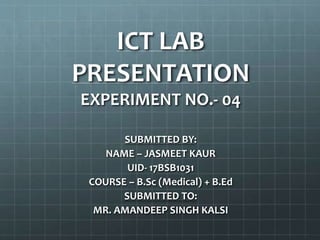
LEVELS OF TEACHING
- 1. ICT LAB PRESENTATION EXPERIMENT NO.- 04 SUBMITTED BY: NAME – JASMEET KAUR UID- 17BSB1031 COURSE – B.Sc (Medical) + B.Ed SUBMITTED TO: MR. AMANDEEP SINGH KALSI
- 2. EDUCATION TECHNOLOGY NAME – JASMEET KAUR UID- 17BSB1031 COURSE – B.Sc (Medical) + B.Ed
- 4. 3 LEVELS OF TEACHING MEMORY LEVEL - Thoughtless UNDERSTANDING LEVEL - Thoughtful REFLECTIVE LEVEL – Upper Thoughtful
- 6. MEMORY LEVEL OF TEACHING The learner has to learn the material, retain the meaningful material, and reproduce that when asked for.
- 8. 1.Objective: The objective of the memory level of teaching is just to impart information or knowledge to the learner. This knowledge or information is factual in nature, which is acquired through a mechanical process (i.e. memorization or rote learning). 2. Aims: To get factual information To train memory faculty To retain the learning material in-memory storage To reproduce and recognize the learned information when required
- 9. 3. Nature of Subject matter: Subject matter should be structured and well organized and of simple nature that can be acquired through rote learning and can be retained and recalled. Subject matter includes information about simple concepts, terms, and elements related to different things of the world. 4. Methods used by Teacher : Teacher dominated methods like drill, review, and revision and asking questions. Drill means repetition or practice for the purpose of attaining proficiency in memorizing the material. Review and Revision is revising the elements to related them with new experience and to form a new association for the development of new skills or learning to solve new problems. Asking the question is to examine whether or not the knowledge level objectives of teaching have been achieved.
- 10. 5.Teaching equipment: Teaching aids such as audio, visual and audio-visual aids. E.g. Models, Charts, Maps, Pictures, TV, Radio, Computers, etc. should be used to develop curiosity among the students. 6. Evaluation System: Oral and written tests are used to test the memory of the students. In evaluation; written test, short type test, recall type, recognition type, multiple choice, alternative type, and matching type test is employed.
- 11. Useful for young children Useful for the acquisition of facts, information of models and structure Help children learn a new concept Useful for slow learners The basics of understanding and reflective level of teaching. Not suitable for higher classes Use of rote memory Dominance of teacher Little interaction in the classroom Not intrinsic motivation Loss of retention and recall The problem of classroom management MERITS DEMERITS
- 12. UNDERSTANDING LEVEL OF TEACHING Understanding implies to know the meanings of things and concepts, to grasp ideas, to interpret some relationship, to comprehend the facts, and to infer one thing from some other. At this level, the learners are required to comprehend factual information, to know the meaning of different concepts and their relationships, and to apply facts, concepts, and principles.
- 14. 1.Aims and Objectives: Comprehension Objectives- Comprised of Translation, Interpretations and Extrapolation. Application Objective- Efficiency to apply to comprehend knowledge in various similar and different situations and settings. Understanding Objectives- It pertains to the understanding to instructional messages, by means of Interpretation, Exemplifying, Classifying, Summarizing, Inferring, Comparing and Explaining, etc. Application Objective- Application objectives include proper procedure for Executing, Implementing; the use of generalized rule or principle in practical life situations. 2. Nature of Subject Matter: Wide Larger in number Larger in quantity
- 15. 3. Methods used by Teacher: Lecture Method Lecture demonstration method Discussion method Inductive and Deductive method Exemplification and Explanation 4. Teaching Equipment: Different charts, models, flashcards, pictures, TV, and many more electronic devices are used as teaching equipment. 5. Evaluation: The teacher has to evaluate the ability to comprehend, grasp, synthesize, discriminate and generalize; and the insight to apply the generalized principles further so, the tests and tools should be properly planned and devised. Written tests should be conducted.
- 16. Effective learning Development of different cognition abilities Sets stages for entering into the reflective level of teaching Effective classroom interaction It ignores higher cognitive abilities Less emphasis on intrinsic motivation No individualized learning Teacher centered MERITS DEMERITS
- 17. REFLECTIVE LEVEL OF TEACHING This level of teaching is the highest level of teaching-learning activity. It does not depend on memorization, understanding of concepts, and their application only; it demands the use of higher mental processes such as reasoning, thinking, analyzing concepts, imagination, ideas and thoughts; and other bodies of knowledge critically, finding out the facts.
- 19. 1.Aims and Objectives: To develop insight into the learner to solve problems. To develop rational and critical thinking in the students. To develop the ability of independent thinking and decision making in the students. 2. Nature of Subject matter: The subject matter is mainly unstructured and open- ended. It is concerned with the problem rather than the subject.
- 20. 3. Methods used by Teachers: Problem solving methods Investigating projects Heuristic method Experimental method Inquiry oriented method Analytical method 4. Evaluation: The evaluation system at the reflective level of teaching should test the higher order cognitive abilities like reasoning, creativity, original thinking, problem-solving, critical thinking, etc.
- 21. The most thoughtful mode of operation Learner centered approach Development of problem solving ability Useful for gifted children Provides maximum flexibility Self motivation Development of creativity Not suitable for lower classes Time consuming process Not suitable for Indian classroom Not applicable for dull students An excess burden on the teacher MERITS DEMERITS
- 22. Teaching is a purposive activity; the purpose is to bring about desirable changes in the learner through learning.